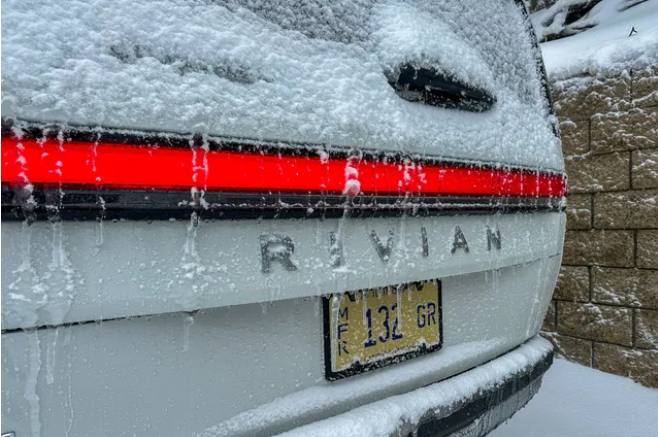Rivian has released its first ever environmental and social impact document, where the company commits itself to developing a new generation electric vehicles which are even cleaner than their current generation.
Rivian carbon footprint of its EVs.
Rivian stated that its goal was to launch a product in 2030 with “half the lifecycle carbon foot print” of its 2022 R1 cars, including the R1T pick-up truck and the R1S SUV. The term “lifecycle carbon footprint” is used to describe all greenhouse gas emissions (direct and indirect) associated with the product’s operations. This would include the production, operation and charging of an EV from conception until it ends up in a junkyard.
Rivian will use more recycled materials in its cars to achieve this. By 2030, Rivian will use a minimum 70 percent recycled material in its steel and aluminum components and a 40 percent minimum recycled and biobased material in its polymer materials.
Rivian will reveal its R2 next-generation vehicles this year. The production date is 2026. One of the company’s first vehicles is expected to be a smaller SUV that will cost between $40,000 and $65,000. The current R1 lineup starts at about $80,000.
Rivian has plans to drastically increase its use renewable energy in order to reduce its carbon emissions. According to the company, its Normal, Illinois factory will be powered by 100 percent renewables in 2030. Rivian also uses renewable energy to power its charging network. It has 385 chargers and 64 stations across the country.
Rivian’s environmental goals are achieved through virtual power purchase agreements. The company is committed to financing renewable energy projects like an 800 Megawatts (MW), built over a former Kentucky coal mine , and another project in Paris Tenn.
The agreements are “virtual”, because the energy will not be used to power Rivian’s trucks, SUVs or vans or the corporate offices and factories of the company. Rivian claims that, while it does not directly finance the solar project, it ensures that the energy will have a market when the photovoltaic panels come online.
In its impact report the company states that it will “support”, the creation of two gigawatts of renewable energy projects in order to achieve its goal of decarbonizing the entire customer charging. Rivian says that this will be enough energy to drive 7 billion miles.
Rivian is at the forefront in the debate about EVs and Climate Change. It has criticized its competitors for being “far off the track” when it comes to reducing greenhouse gas emission levels that are compatible with the Paris Agreement. Along with Polestar the company authored a report arguing that EVs would not be enough to curb global warming. The auto industry will need to take a more active role in increasing renewable energies in power grids, and reducing greenhouse gases across its supply chain.
Rivian claims that it will increase by 50% the number of underrepresented groups in its leadership ranks, as well as across the entire company, by 2028, despite the fact that Republicans led Elon Musk are attacking corporate diversity, equity and inclusion programs.
The company has lofty ambitions, but it is struggling to become a major player in the automotive industry. Although its trucks and SUVs have received positive reviews and are popular among customers, the higher prices make them unaffordable for many potential buyers in a time where mass adoption of EVs is slowing.
Rivian has delivered fewer vehicles in the fourth quarter 2023 than the previous quarter. This is what caused its share price to drop recently.
Updated January 12th at 9:53AM ET to clarify information regarding Rivian’s network of charging stations and the facility power sources.
